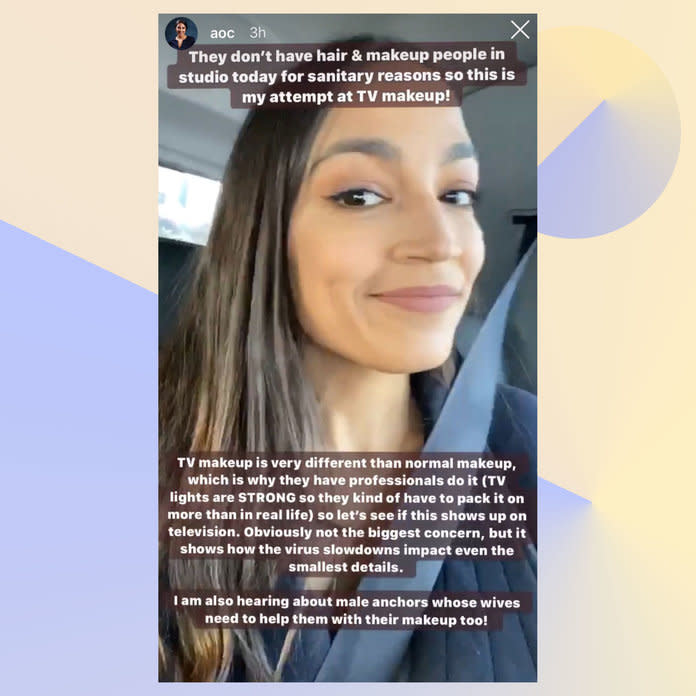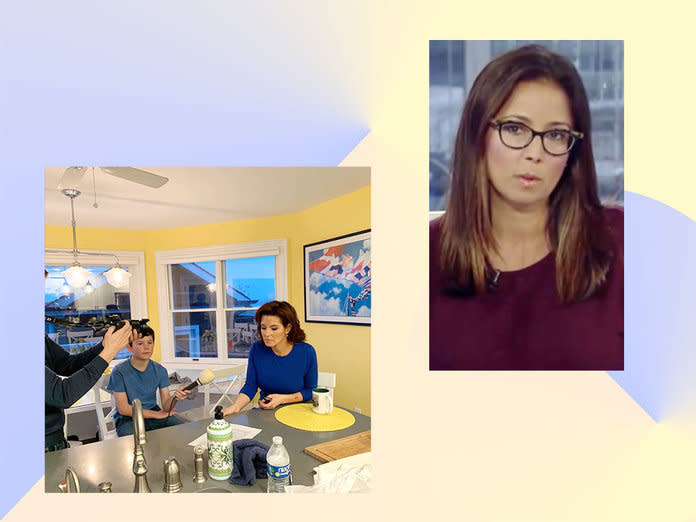Newscasters Are Doing Their Own Hair and Makeup for TV
A post shared by Joy-Ann Reid (@joyannreid) on Mar 23, 2020 at 1:06pm PDT

"My first, second, and third thought is for the incredible people who do our hair and makeup," Nicolle Wallace told InStyle. "Yes, they make us look our very best, and no, I have no idea what I'm doing with a curling iron, but what people don't know is that sometimes plopping down in the makeup chair is the first and only time of our day when we just sit there and catch up about our kids or the news outside politics."
Twitter buzzed in response to newscasters, anchors, and other public-facing women going on-air without makeup, or, at least, the on-air makeup done by professionals. While comments ridden with casual sexism bubbled up, pointing out who looked tired or how someone had "obviously" been getting lots of help from the hair and makeup department previously, there were also comments celebrating a sort of comfort in seeing the people who keep us informed looking normal, when life in the middle of a global pandemic seems anything but.
RELATED: Why 95.8% of Female Newscasters Have the Same Hair
Thousands of individuals are working from home, and many are juggling not having childcare or school for their children, doubling up on full-time work and full-time homeschooling at the same time. Schedules are off, and even as we stagger close to carrying on as normal, it doesn't feel like it. There's some relief in the idea of rejecting beauty standards that add another degree of pressure to public-facing people already doing a stressful job. It's a point of reflection — a commentary on the emphasis placed on women's appearance while on television. But it's also an opportunity to look closer at the critical work that often remains hidden from view when we flip on the news. The fact that viewers are reacting to a newscaster or anchor's makeup at all pokes at a larger conversation not just about the emphasis placed on appearances, but on the invisible workforce that, because of work-from-home mandates, has been pushed out of work entirely.
As social-distancing guidelines leave many people unable to work, the United States recently has broken its records for claims of joblessness — 3.2 million Americans filed for their first weeks of unemployment benefits in the week ending March 21, 2020, according to CNN, making it the largest number of jobless claims in history. Thousands of Americans are ill, lack access to appropriate testing and care, and hundreds more are facing loss of income or ability to pay rent, loss of loved ones, and new responsibilities as caretakers. In calling out how she misses her moments in the makeup chair, Wallace demonstrates another important facet of this new normal: how reliant we are on each other, day-to-day, as work shifts to home in response to COVID-19.
RELATED: Savannah Guthrie and Hoda Kotb on Changing TV for the Better
"I consider myself very blessed to work from home," said Wallace of her own experience. "But I miss the warmth and kindness of the wonderful people who do our hair and makeup." Wallace has been vocal about the complexities of broadcasting from home during coronavirus, sharing that while she was in a home studio, her son was upstairs building with Legos, and pointing out that things like sound glitches are powerful examples of how important technicians are to a seamless broadcast.
There is indeed an awkward pause - better broadcasters smooth it over more seamlessly than I do. “Tech” is all over it - “tech” is the reason we are doing the unthinkable from our homes - making live tv - with our kiddos close by. “Tech” isn’t the problem-they are the heroes. https://t.co/S12xusE1vW
— Nicolle Wallace (@NicolleDWallace) March 26, 2020
Wallace adds an important point: We have to acknowledge the people who make countless fields turn even if they aren't the public faces of it. It's a wake-up call to how much happens behind-the-scenes, and where that labor gets distributed when not everyone can work from home (or do their job and maintain a safe social distance). It makes newscasters vulnerable to criticism for their appearances, not their actual work, and renders some of the artists responsible for hair and makeup vulnerable without pay.

The work beauty professionals do often falls right in line with habits we're supposed to avoid during coronavirus, including face-touching. A makeup artist in Toronto pointed out in an interview with Slate, that if they contracted the virus, they'd likely have to toss any powder makeup in their kit (experts still don't know much about how COVID-19 lives in beauty products), which would lead to loss, and that being out of work for multiple days or weeks would be detrimental to their income. Now, a petition is spreading for hair and makeup professionals, as well as stylists and other freelancers, to be added to the Families First Coronavirus Response Act, in order to support independent contractors through this period of time when engaging closely with clients difficult or not possible because of social distancing.
"As a fashion stylist, my job is very hands-on and the current circumstances make earning a living impossible," Kusum Lynn, a stylist who typically works with retailers and brands, told InStyle. Lynn is among the freelancers who signed the petition, explaining that she hasn't been able to work from home during the coronavirus crisis. "I am deeply concerned for the economic well-being of all freelancers and independent contractors in my industry and otherwise," Lynn said. "Feeling rather helpless and at the mercy of our government to provide relief is what compelled me to sign this petition." She has also emailed representatives asking them to support freelancers, independent contractors, and small business owners.
RELATED: Behind the Scenes on SOTU Day with Dana Bash and the Women of CNN
"I have seen all of my foreseeable bookings canceled, unpaid invoices are being pushed out to later payment dates, and I can only hope that vendors and clients are able to stay to open to pay my invoices for work I have already performed," continued Lynn. "This pandemic has exposed how vulnerable we freelancers are and how very close to the razor's edge we live on a daily basis."
According to CNBC, the new stimulus package does loosen unemployment insurance eligibility requirements to include individuals who are self-employed or gig workers. Workers who are furloughed or who can no longer work will also be covered under the expansion. The House approved the bill on the afternoon of Friday, March 27.
Of course the variety of workers who are impacted stretch to many other aspects of TV production, and beyond. "My kids have become audio technicians," Stephanie Ruhle, MSNBC Live anchor and NBC News Senior Business Correspondent, told InStyle. "As we were shooting a story for NBC Nightly News on the effect of coronavirus on small businesses, my son stood in as my mic operator and now, like it or not, it's his daily gig."
RELATED: What It’s Like to Be a Scientist on the Front Lines of the Coronavirus Pandemic
A post shared by Stephanie Ruhle (@stephruhle) on Mar 24, 2020 at 4:46am PDT
As smooth as these improvised productions may end up looking to viewers at home, they should serve as a reminder of the artists who usually do behind-the-scenes work — and just how many people it takes to keep the show going on.

